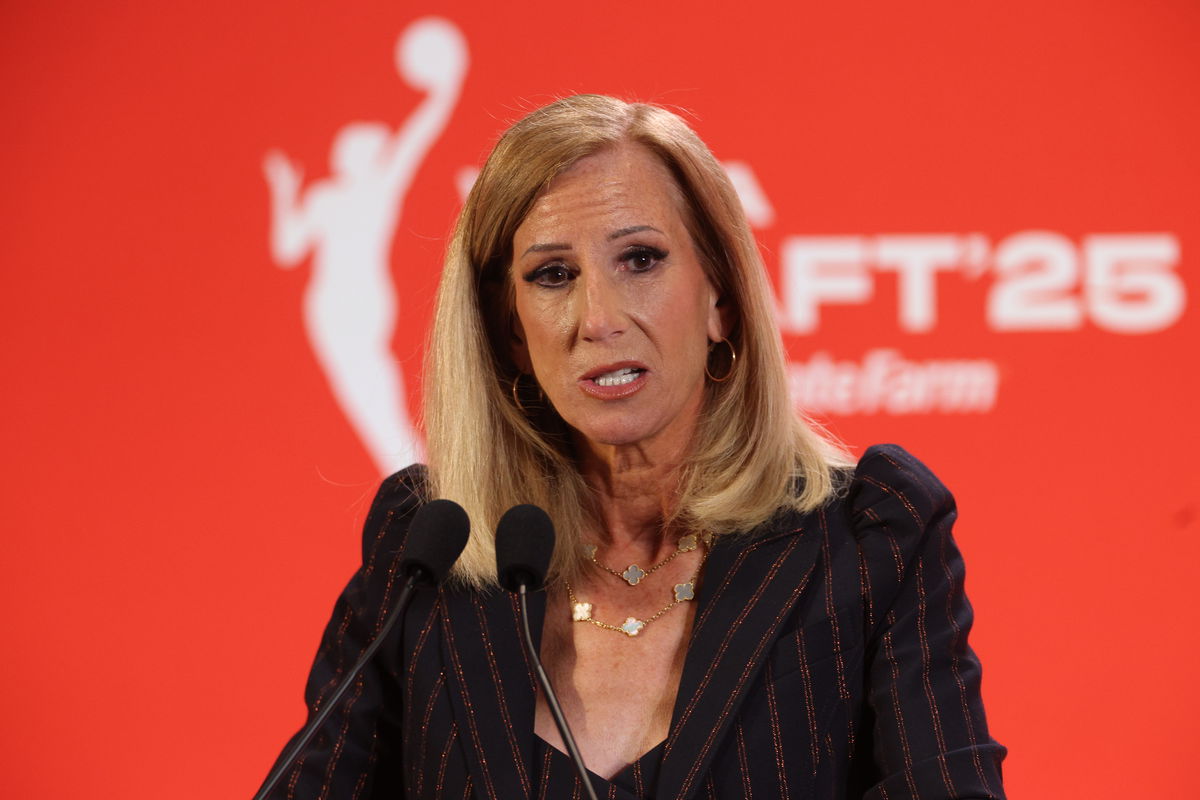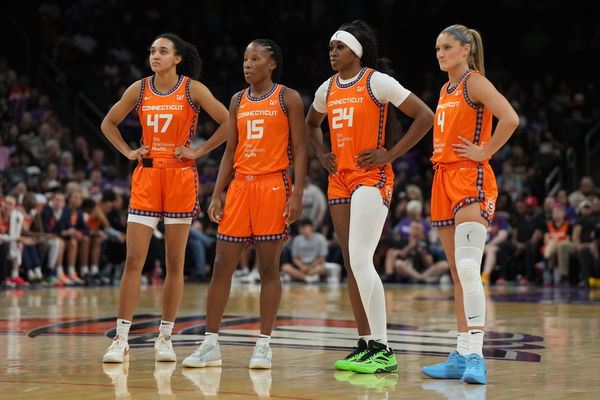
Imago
Apr 14, 2025; New York, New York, USA; WNBA commissioner Cathy Engelbert talks to the media before the 2025 WNBA Draft at The Shed at Hudson Yards. Mandatory Credit: Vincent Carchietta-Imagn Images

Imago
Apr 14, 2025; New York, New York, USA; WNBA commissioner Cathy Engelbert talks to the media before the 2025 WNBA Draft at The Shed at Hudson Yards. Mandatory Credit: Vincent Carchietta-Imagn Images
Controversy has a way of finding the WNBA, and this time it came for a $300 million worth team. The league might already be heading towards a lockout as the CBA deadline edges closer. Add to the fact that multiple expansion teams are coming, and no rules have been set for expansion drafts. Also, remember the chaotic unraveling of the Connecticut Sun deal? While Cathy Engelbert may claim “We want the same things as the players want,” their storyline is far from sunshine and roses. The latest focal point? The Phoenix Mercury.
Watch What’s Trending Now!
To clear up any confusion – no, there is no issue with Mercury on the hardwood. They are comfortably looking at a playoff berth with a 23-14 record. But their woes lie outside the court, specifically in the ownership of the team. The Phoenix Suns and Mercury ownership group have started a legal kerfuffle. With the league being slammed left and right with issues, this is the last thing Cathy Engelbert wants to happen.
According to Front Office Sports report, minority owners Kisco WC Sports II and Kent Circle Investments have filed a books-and-records lawsuit against Suns Legacy Holdings LLC in the Delaware Court of Chancery, demanding that both the Phoenix Suns and Phoenix Mercury open their financial books. The suit alleges mismanagement, undisclosed side deals with partners, and a retaliatory capital call against the two groups.
ADVERTISEMENT

Imago
Aug 5, 2025; Phoenix, Arizona, USA; Connecticut Sun guard Leila Lacan (47), guard Lindsay Allen (15), forward Aneesah Morrow (24), and guard Jacy Sheldon (4) line up against the Phoenix Mercury in the second half at Footprint Center. Mandatory Credit: Rick Scuteri-Imagn Images
The dispute raises fresh questions about majority owner Mat Ishbia’s management of the franchises. Tensions began in September 2024, when Kisco, dissatisfied with Ishbia’s management, entered negotiations to sell its stake to him. Ishbia had acquired a reported 57 percent share of the Suns and Mercury in 2023 at a $4 billion valuation. Kisco, led by former tennis player Andrew Kohlberg, and Kent Circle, led by real estate investor Scott Seldin, remain the only minority partners in the ownership structure.
The lawsuit points to a lack of transparency in the financing of a Mercury practice facility as one example of mismanagement. While the Suns declined public comment, an August 26 letter from team attorney David Marroso of O’Melveny & Myers LLP countered the claims. The letter states that Kisco and Kent Circle demanded Ishbia purchase their interests for $825 million, which would value the franchises at more than $6 billion. This is roughly a 60 percent increase from Ishbia’s 2023 deal. Though the case now proceeds in court, the legal battle casts an unfavorable shadow over both Phoenix franchises and, by extension, the WNBA.
ADVERTISEMENT
Why the Phoenix Mercury debacle is bad for the WNBA?
Truth be told, Cathy Engelbert deserves credit for capitalizing on the WNBA’s surge in popularity. A new $2.2 billion media rights deal and new expansion teams all highlight her progress. Yet, the league’s long-term growth requires deeper investment from major industry players. The recent Phoenix Mercury ownership dispute has raised concerns and undercut confidence in the WNBA as a secure investment.
ADVERTISEMENT
Those concerns are further magnified by the failed sale of the Connecticut Sun. Steve Pagliuca and the Mohegan Tribe were all but ready to shake on the transfer of ownership. Backed by the original owners’ approval, Pagliuca tabled a strong offer: $325 million plus an additional $100 million practice facility. But as fate has it, Engelbert botched this deal for the Connecticut Sun. How? Engelbert didn’t present Steve Pagliuca’s offer to the board of directors timely. And the exclusivity window between Pagliuca and the Mohegan Tribe expired.
Top Stories
Patrick Mahomes’ Dad Faces 10-Year Prison Sentence After Chiefs QB’s Father Reportedly Violated Probation Terms

PGA Tour Split Into Two as Scottie Scheffler Confirms Stance on Patrick Reed’s Return

Multiple PGA Tour Pros Stopped from Playing as WM Phoenix Open Round Is Canceled Over Recurring Problem

Scottie Scheffler Faces Scrutiny After Taking Out Anger on Golf Club at WM Phoenix Open: ‘Washed’

Jordan Spieth Throws Bizarre Temper Tantrum as Opening Round at WM Phoenix Open Becomes a Challenge

“Stay Right There on the Bench”: LSU’s Grace Knox Faces Backlash After Heated Moment in 64-77 Loss vs Texas

WNBA Analyst Quita sharply criticized Engelbert’s move, arguing the league prioritizes NBA ties over suitable ownership candidates. “If you are not NBA-backed, you don’t matter,” she said. “The WNBA only wants NBA billionaires. That’s it. As if being worth a few billion dollars is not enough unless you have an NBA logo stamped on your resume.”
All these instances paint the WNBA and investing in its teams as a risky affair. Furthermore, these challenges risk slowing the league’s momentum at a critical moment in its rise. While the Phoenix Mercury deals with infighting, all eyes are on what steps the league will take.
ADVERTISEMENT
ADVERTISEMENT
ADVERTISEMENT
ADVERTISEMENT
